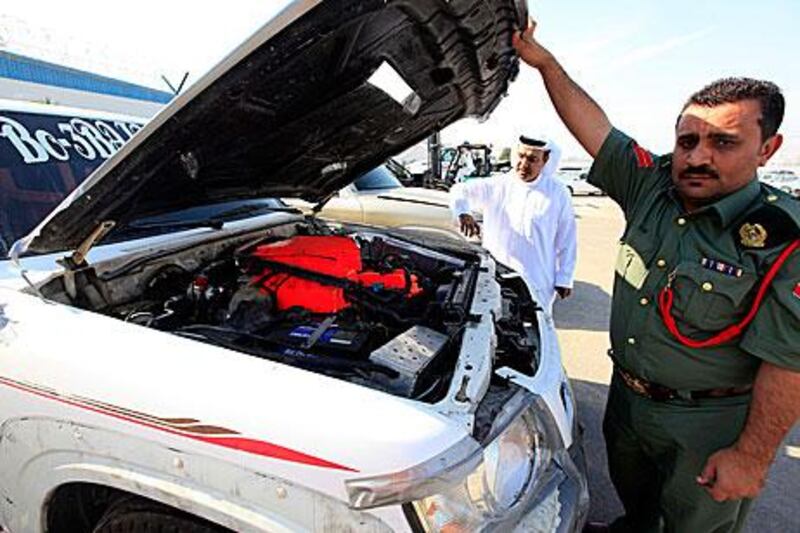DUBAI // Police have seized two 4x4 cars that were using aviation fuel to race on public roads at more than 300kph.
The pair of Nissan Patrols had been illegally modified by garages to allow them to run on the high-octane fuel.
Police believe the races were organised by the garages to promote their modification services.
The cars raced for about 3 kilometres on the road to Sharjah on the Dubai bypass at about midnight on December 6, watched by the occupants of about 25 other cars.
Police from the Isnad [support] team that targets reckless driving waited until the race was over before moving in.
"We did not want to intervene while they were racing, as we did not want to get dragged into a car chase that might have endangered the security of other road users, as they were driving at extremely high speed," said Col Saif Al Mazroui, deputy head of the Dubai Police traffic department.
The two drivers, both Emiratis in their 20s, have been referred to the public prosecution on charges of endangering lives. Police are also hunting other drivers who helped to organise the race.
This was just the latest in a string of cases of cars being modified to use aviation fuel. Dubai Police said they had confiscated more than 20 vehicles since last year.
Aviation fuel has a higher octane rating than regular petrol. It indicates how much a fuel can be compressed before ignition, allowing it to produce more power.
Most motor fuel has a maximum octane rating of 100, but aviation fuel can have a rating of up to 145.
Standard car engines cannot handle the greater compression required, but they can be modified.
Police believe several Dubai garages are selling the aviation fuel for between Dh45 and Dh67 a litre.
The garages who modified the seized vehicles had installed additional petrol tanks and connected them to the engine.
They had also removed the rear seats and the inner parts of the doors, and replaced the boot door with fibreglass to make the vehicles lighter and quicker. The cars had no number plates, to avoid identification.
Col Al Mazroui believes the race was arranged by two garages.
"They planned the race in complete secrecy and they used several tricks to mislead police, including transporting the vehicles on a tow-truck through different parts of Dubai, before delivering it to its agreed destination," he said.
"We were monitoring the group for several weeks and following them step by step to ensure that they did not get away and we documented everything with pictures."
The vehicles were confiscated after they were put back on the tow-truck after the race.
Up to the end of November of this year, 69 people had been caught racing on Dubai roads. Last year, 82 people were apprehended.
But Col Al Mazroui fears illegal racing groups are becoming more organised and harder to track.
"They are agreeing between themselves not to give any information about each other if caught by police, or about the garages that sponsor these cars," he said.
It is also difficult to prosecute the garages, with police powerless to do anything beyond informing the economic department of their unlicensed activity.
"We cannot take any further actions against them within the legal framework," said Col Al Mazroui.
In a separate case, police confiscated another 4x4 vehicle in the desert near Al Waraqaa on Friday night.
They are now searching for the driver, after undercover police spotted him performing stunts on the hard shoulder of the road, near the campsites.
They recovered an Emirates ID card from the car, and said the driver is a 14 or 15-year-old boy.






